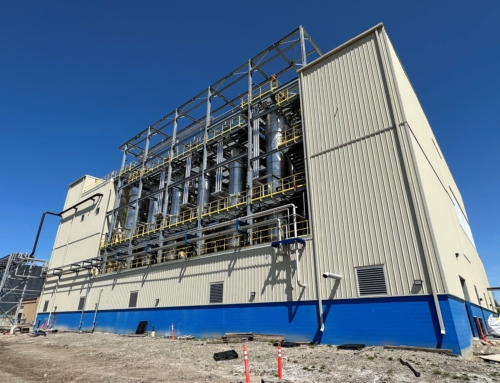Cooperative will produce up to 80 million more pounds of sugar annually from molasses
MONITOR TOWNSHIP, MICHIGAN – Michigan Sugar Company today announced plans to invest more than $65 million to construct a desugarization facility at its factory located at 2600 S. Euclid Ave. in Bay County’s Monitor Township (commonly known as the company’s Bay City factory).
The facility will allow Michigan Sugar Company to produce up to an additional 80 million pounds of pure, all-natural sugar annually from molasses that is a byproduct of the process through which sugar is extracted from sugarbeets. Currently, Michigan Sugar Company has the capacity to extract additional sugar from 60% of its molasses. The new facility will allow the company to extract additional sugar from 100% of its molasses.
The project is expected to begin in fall 2021 and is scheduled to take 18 to 24 months to complete. Once operational, the company expects to process as much as 650 tons of molasses daily, up from the current amount of 325 tons per day.
“This enormous undertaking, investment, and commitment by our grower-owners will have a multi-generational impact for our cooperative,” said Mark S. Flegenheimer, President and CEO of the company, which was founded in 1906 and became a grower-owned cooperative in 2002. “This is a historic day for our owners, our employees, our customers and our community.”
Flegenheimer explained the enormous economic impact the new facility will have.
“Simply put, we can sell sugar at a higher price than we sell molasses,” he said. “Our nearly 900 grower-owners will see added annual revenue of $10 million to $15 million, in perpetuity.”
Michigan Sugar Company’s grower-owners are spread out across about 20 Michigan counties, as well as Ontario, Canada. The 13-member Co-op Board of Directors approved the desugarization project earlier this year.
“This facility will replace our current desugarization equipment that was installed in the 1990s,” said Adam Herford, a grower-owner from Elkton who serves as Chairman of the Board. This is one of the most substantial investments made in the history of our company and brings Michigan Sugar Company up to par with other sugar producers across the United States.”
Before desugarization equipment was installed at the Bay City factory in the 1990s, Michigan Sugar Company sold all its molasses as a byproduct.
Herford said that at the heart of this investment is a story about sustainability.
“We are going to produce up to 80 million more pounds of sugar annually without planting another acre of sugarbeets,” he said, adding Michigan Sugar Company’s grower-owners annually plant and harvest about 160,000 acres of sugarbeets. “That means 80 million more pounds without any additional passes over our farm fields with our equipment, without any further spraying of our crops to ward off disease and pests, and without burning any additional fuel on our farms to expand operations.
“This truly is a win-win for all involved.”
As part of the $65+ million investment, Michigan Sugar Company plans to add $4 million in juice softening equipment at its factory in Caro and its factory in Sebewaing, said Jason Lowry, Michigan Sugar Company’s Vice President of Operations. Lowry explained that when factories desugar molasses, they need the molasses to be soft.
“We have juice softening equipment already in Bay City and we installed juice softening equipment at our factory in Croswell as part of a $70 million capital upgrade of that facility over the past six years,” Lowry said. “Now, we’ll add that equipment in Caro and Sebewaing, which means those factories, and those communities, also will benefit from our investment.”
Pedro L. Figueroa, Michigan Sugar Company’s Vice President of Sales and Marketing, said the investment in the desugarization project completely aligns with a goal to drive sales of Michigan Sugar’s Pioneer Sugar brand, as well as private label, value-added packaged sales with the company’s key partners.
“Our project also ensures a significant volume in our “farm-to-table” and Certified Vegan sugar supply through agricultural and food production sustainability improvements, in addition to creating important scale-up efficiencies that will consistently increase domestic sugar production in Michigan for many, many years to come,” said Figueroa.
Community leaders praised Michigan Sugar Company’s investment.
“Michigan Sugar has demonstrated its commitment, leadership, and major economic impact to our community with the announcement of this transformational capital investment,” said Trevor Keyes, President and CEO of Bay Future Inc., which helped Michigan Sugar Company in numerous ways as this project was being planned “As one of Bay County’s top employers, the impact of this project will have a ripple effect throughout Bay County, providing both direct and indirect benefits across businesses and to community members who call Bay County home.”
Added Monitor Township Supervisor Terry Spencer: “As one of our township’s largest taxpayers and employers, we depend greatly on Michigan Sugar Company as a pillar of our economy. This is a company with 930 year-round employees, 1,100 seasonal workers, an annual payroll of more than $65 million, and an annual economic impact of more than $500 million.”
Spencer emphasized that although this project has an attention-grabbing price tag, Michigan Sugar Company has made significant investments at its Bay City factory for years.
“This company literally invests millions of dollars each year to improve its facilities and operations,” he said. “Michigan Sugar’s factories are among the oldest in the world, but inside they are filled with state-of-the-art equipment and technology. We are so fortunate the company’s grower-owners have continued to invest in these factories and these communities year after year after year.”









